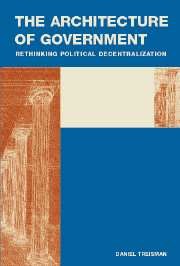Book contents
- Frontmatter
- Contents
- List of Figures and Tables
- Preface
- Glossary of Main Notation Used
- 1 INTRODUCTION
- 2 THE POLITICAL PROCESS
- 3 ADMINISTRATIVE EFFICIENCY
- 4 COMPETITION AMONG GOVERNMENTS
- 5 FISCAL POLICY AND REDISTRIBUTION
- 6 FISCAL COORDINATION AND INCENTIVES
- 7 CITIZENS AND GOVERNMENT
- 8 CHECKS, BALANCES, AND FREEDOM
- 9 ACQUIRING AND USING KNOWLEDGE
- 10 ETHNIC CONFLICT AND SECESSION
- 11 DATA TO THE RESCUE?
- 12 CONCLUSION: RETHINKING DECENTRALIZATION
- References
- Index
- Titles in the series
4 - COMPETITION AMONG GOVERNMENTS
Published online by Cambridge University Press: 05 June 2012
- Frontmatter
- Contents
- List of Figures and Tables
- Preface
- Glossary of Main Notation Used
- 1 INTRODUCTION
- 2 THE POLITICAL PROCESS
- 3 ADMINISTRATIVE EFFICIENCY
- 4 COMPETITION AMONG GOVERNMENTS
- 5 FISCAL POLICY AND REDISTRIBUTION
- 6 FISCAL COORDINATION AND INCENTIVES
- 7 CITIZENS AND GOVERNMENT
- 8 CHECKS, BALANCES, AND FREEDOM
- 9 ACQUIRING AND USING KNOWLEDGE
- 10 ETHNIC CONFLICT AND SECESSION
- 11 DATA TO THE RESCUE?
- 12 CONCLUSION: RETHINKING DECENTRALIZATION
- References
- Index
- Titles in the series
Summary
Just as market competition pressures firm managers to reflect the interests of shareholders, competition among local governments helps to limit government's predatory behavior. Mobile resources can quickly leave jurisdictions with inappropriate behavior. Competition for mobile sources of revenue prevents local political leaders from imposing debilitating taxes or regulation.
Yingyi Qian and Barry R. Weingast (1997, p. 88)Unlike competition in goods markets, there can be no presumption that competition for investment is efficiency enhancing (on the contrary, it directs capital to less efficient locations), and it clearly has the potential to result in “races to the bottom” in terms of wages, social protections, environmental standards, and tax base degradation via subsidies and lower tax rates on mobile actors. Conscious intervention in markets is necessary to prevent these negative outcomes.
Kenneth Thomas (2000, p. 271)Political decentralization is often thought to induce a beneficial kind of competition between subnational governments. Competition among firms in a market motivates them to cut costs, please consumers, and innovate. By a similar logic, competition among subnational governments to attract mobile residents or capital might render them more efficient, honest, and responsive to the demands of constituents. As Friedrich Hayek (1939) put it, when states must compete against one another, major interference in economic life becomes “altogether impracticable.” Such competition forces governments to “avoid all sorts of taxation which would drive capital or labor elsewhere.”
Do such arguments add up to a general reason to favor political decentralization over centralization?
- Type
- Chapter
- Information
- The Architecture of GovernmentRethinking Political Decentralization, pp. 74 - 103Publisher: Cambridge University PressPrint publication year: 2007

